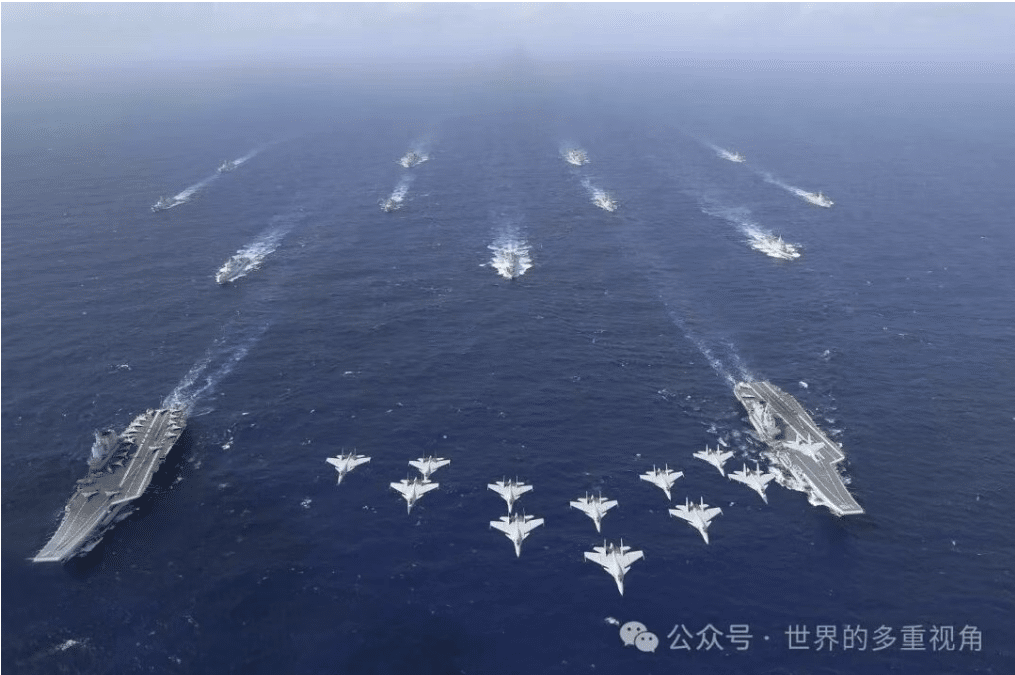Japan’s Prime Minister Takaichi Finally Says Something Close to What Beijing Wants to Hear
An Interview with John Givens: Responding to “Is Asia the Powder Keg for World War III?”
- Interviews
 Juan Zhang
Juan Zhang- 10/03/2024
- 0

In this interview, we focus on the research of John Wagner Givens, Associate Professor of International Relations at Spelman College in Georgia. During the conversation, Givens explained the Biden administration’s China policy, analyzed why young Americans are losing interest in learning Chinese, and discussed the importance of encouraging them to study the language, along with potential solutions to this issue. Notably, when asked about Chinese scholar Professor Zheng Yongnian’s claim that Asia could be the powder keg for World War III, Givens provided a very rational and thoughtful analysis.
Juan Zhang: In the “Is the World Ready for China Risen” article, you wrote that the number of Americans learning the Chinese language is declining dramatically. You explained the potential negative impacts in depth. With such an adversarial relationship, is there still a need to encourage young Americans to learn Chinese?
John Givens: In many ways, it is more important than ever for the United States and the world to cultivate knowledge of China in general and Chinese language skills specifically. Even at the height of the Cold War, there was a profound need for the study of Russian. China is both a much stronger potential adversary and a much more important potential partner than the Soviet Union ever was. This is what I try to highlight in my articles on the subject: it does not matter how positively or negatively you view China, it is important. Whether you are a hawk or a dove, a “panda hugger” or “dragon slayer,” China occupies a vital place in the world, and we need to pay more attention to it, and not just on the superficial level of current events. We need people with real expertise in the culture, history, economy, politics, and especially language.
In the case of the Soviet Union during the Cold War, there were good reasons to learn Russian (above and beyond the usual reasons it is always worth learning a new language). But most of these reasons were related to diplomacy, intelligence, and security. Today, with China, all those needs are just as pressing, but China is incredibly important in almost every aspect of international affairs. It is economically and technologically central in a way that the Soviet Union never was. At its zenith, the Soviet Union only accounted for about 12% of the World’s GDP; China has surpassed that and depending on how you measure may now have the largest economy in the world. Moreover, China is now responsible for at least 20% of global manufacturing, with some estimates much higher. China is explicitly economically fundamental to the United States. According to the Congressional Research Service, in 2023 China was the 4th largest trading goods partner and U.S. export market with trade in the 100s of billions. In 2022, about 7.5% of U.S. exports went to China and 16.5% of its U.S. imports came from there. The 1984 numbers for the United States and USSR were 1.5% and 0.5%, not even close to comparable.
The rest of the world, including the United States, needs China’s help on a host of issues including dealing with Russia, North Korea, Iran, and global pandemics and climate change. All of these have vastly different dynamics, but all have a, at least potentially, pivotal role that China could play. China has also become an increasingly important partner in investment, trade, diplomacy, and development across the world, especially in Asia, but also Latin America, Europe, and Africa.
In this sense, China is our most important adversary and our most important ally. It may be better to think of it as the British Empire at its height rather than the Soviet Union. In 1913 the British Empire produced about 19% of the World’s GDP, which is about what China produces today. Chinese language education should be everywhere in the United States, but the reality is that it is small and still declining.
JZ: Are there measures to be taken that could attract more students to learn Chinese?
JG: There are absolutely efforts to attract and teach more students Chinese and I applaud them, but to be perfectly honest they are wildly inadequate. There are scholarships like the Critical Language Scholarship (CLS) that help pay for school while encouraging students to study languages including Chinese. There are programs like the National Security Education Program (NSEP) and language flagship programs that can incentivize learning Chinese through career tracks in government or international relations. There are study abroad programs and academic exchanges. The Schwarzman Scholars program encourages students to engage with China by creating a prestigious scholarship like the Rhodes, but instead of Oxford, recipients study at Tsinghua University in Beijing. I am particularly proud of our students at Spelman College, who have been extremely successful in becoming Schwarzman Scholars.
Given the need, however, the kinds of efforts discussed above are not nearly enough. For example, CLS supports around 500 students a year in 15 languages. We can and should be doing 10 times that just for Chinese. Maybe that sounds like hyperbole, but according to the Beijing Review, China produces around 200,000 graduating English majors every year. English is a compulsory subject from primary school to high school. The United States cannot hope to match this, but it is hard to draw any conclusion other than that our efforts are so woefully insufficient we essentially are not even trying.
I will reiterate the misguidedness of kicking out the Confucius Institutes and replacing them with nothing. There is no evidence Confucius Institutes were doing anything nefarious on university campuses. But even if they did, it would only underscore the importance of replacing their loss with other programs that would support Chinese learning. Instead, we got rid of this resource for Chinese education paid for by the Chinese state and replaced it with nothing.
To be totally fair, while more financial support would help, students just are not that interested. The vibes are bad. For Americans in general and young ones in particular most perceptions of China are negative and only becoming more so. While Korea and Japan are viewed favorably due to K-Pop, K-Drama, anime, and other aspects of East Asian culture, China is more likely to be associated with its authoritarian politics, persecution of Uighurs, and geopolitical rivalry with the United States, not to mention increasingly conservative legal and social attitudes that do not just repress LGBTQ+ people, but even seek to censor men who are insufficiently masculine. Additionally, Chinese is a difficult and time-consuming language to learn. It is classified by the State Department as a Category IV “super-hard language” requiring more than 3 times as much time to learn as a language like French. All of this helps explain why more American students studied abroad in Ireland in 2019 than in China.
It would take massive and multidimensional measures to change this. Honestly, it probably is not possible to hit the levels of interest and expertise in China we should have, but our current efforts are clearly insufficient and need to be increased tenfold.
JZ: Recently, we published an article by the Chinese expert Zheng Yongnian. He argues that tension in Asia has the potential to ignite World War III. How do you respond to his argument?
JG: Zheng Yongnian’s assertion that Asia could be the spark for World War III is a serious one, but we need to view it through a wider lens. Yes, the region holds potential for conflict, particularly around flashpoints like Taiwan and the South China Sea, but framing it as an inevitable battleground, especially for a third world war needs to be carefully disaggregated. Different possible scenarios, issues, and flashpoints suggest very different conflicts. The key question is not whether conflict is possible, but what steps will be taken to manage these tensions and avoid escalation.
The United States has a critical role in shaping what happens next in the Asia-Pacific. However, Washington’s strategy has often been reactive rather than constructive. The rise of China, for instance, has been predicted for decades, yet the United States and its allies were caught flat-footed, particularly in non-military areas like economic preparedness and educational investment. This has left the United States ill-prepared to handle China’s growing influence in ways that don’t lead to direct conflict.
Militarily, the United States still holds significant advantages, but that’s only one part of the equation. Diplomatic and economic engagement are just as crucial, and in these areas, America’s efforts have often fallen short. It is not enough to bully China through military might; the United States needs a long-term strategy that builds resilience in the region through alliances, trade, and diplomacy, including with China. This is especially important in relation to Taiwan. While military deterrence is critical to its defense, a scorched-earth approach to Taiwan would be morally, economically, and diplomatically disastrous.
We need to consider various flashpoints differently. Tensions over disputed islands in the East or South China Sea could perhaps lead to a shooting war between China and some of its neighbors and/or the United States. Yet, in history, there has rarely, if ever, been a serious conflict over small uninhabited territories. Certainly, rights to potential natural resources, fishing, and freedom of navigation can all exacerbate the conflict, but it is hard to see a dispute or incident related to Scarborough Shoal or the Senkaku (aka Diaoyu) Islands spiraling into anything bigger than a limited conflict between a small handful of actors.
A potential conflict over Taiwan is more worrying. Both the United States and China might see sufficient core interests involved to escalate the war, but while such a war could be extremely devastating for Taiwan it seems unlikely to escalate far beyond that theater. Here we see strong parallels with the war in Ukraine. Russia has launched a full-blown invasion of a neighboring sovereign nation. That nation has received support from the European Union, the United States, and other allies. It has also invaded part of Russia. Yet, as brutal as the conflict is, it shows no signs of spinning out of control and drawing in the wider region, much less the world.
The idea that the United States would invade mainland China to stop an attack on Taiwan or that China would launch an attack on Japan to advance its invasion of Taiwan seems unlikely. Less likely still, but not impossible, is the idea that other countries in the region, Vietnam, India, or the Philippines could take advantage of a distracted China to seize disputed territory. Pakistan could perhaps come to China’s aid and attack India or move into Kashmir. North Korea might decide that South Korea is most vulnerable with the United States engaged in Taiwan. The chances of this all happening at the same time are extremely remote and even then, considering how many of these conflicts are over relatively small and sparsely inhabited bits of territory (with the obvious exceptions of Taiwan, Kashmir, and South Korea) it is hard to see this spiraling into a conflict that could accurately be termed World War III.
Ultimately, conflict in Asia is very possible but not a foregone conclusion. The chances of conflict spinning out into a global catastrophe are much smaller. Still, the danger lies in policy missteps or an over-reliance on military solutions that could cause smaller conflicts to spiral into bigger ones. To avoid this, the United States must move beyond crisis management and start investing and engaging heavily in the region, economically and diplomatically for the long haul. The real question is not whether Asia will ignite a third world war, but whether Asia can come together to prevent smaller conflicts.
JZ: You wrote a couple of articles on China’s rise. With its current mounting economic challenges and a tense geopolitical environment, do you still think China is on a trajectory of rising as a superpower? Or is the United States overstating China’s rise?
JG: Considering China’s current economic challenges and the tense geopolitical climate, I would argue that while China’s rise as a superpower may not follow a straight, uninterrupted path, its trajectory remains upward. China has significant issues related to real estate, local government debt, youth unemployment, a rapidly aging society, suppression of minorities, and general economic slowing. The United States tends to oscillate between overstating and underestimating China’s potential. China’s economic downturn and the Tiananmen Square massacre seemed economically and politically disastrous in 1989 and 1990, yet today they seem a mere blip in the CCP’s continued rise to power. We need to remember that China’s rise was never going to be without bumps.
Looking at the broader picture, China’s economic and military growth over the past several decades has been nothing short of remarkable. Even with its current economic issues, China’s global influence continues to expand through initiatives like the Belt and Road and its dominance in critical sectors including technology and manufacturing. It is worth noting the adaptability of China’s leadership thus far, shifting policies to pursue growth and hold on to power. But it cannot be overlooked that we are now in a new era of leadership in China, previous consensus-based leadership with factions checking each other’s power has been replaced by the dominance of Xi Jinping. What this will ultimately mean is impossible to predict, but it is still true that China’s leaders probably have, by far, the most significant economic and political war chest in the world.
However, China’s rise doesn’t automatically mean that it will replace the United States as the world’s dominant superpower. The United States still holds significant advantages—militarily, economically, and diplomatically. Moreover, as I have written before, the West, and particularly the United States, has been slow to adequately prepare for this reality. Instead of overhyping China’s rise, the United States needs to focus on its own shortcomings, particularly in education, R&D, and infrastructure, if it wants to remain competitive in a world where China will inevitably play a major role.
In short, China’s path to superpower status may be more complicated and slower than some predicted, but it is still on track. We should not dismiss China’s potential or assume that its current challenges will permanently derail its rise. What’s critical now is for the United States and its allies to adapt to this reality, engage strategically, and invest in their own capabilities to ensure they’re prepared for a world in which China plays a leading role.
JZ: The Russia-Ukraine war is still dragging on. Many analysts have been asking what this war means for Taiwan, arguing that Taiwan is the flashpoint for a potential conflict between China and the United States. If China, Taiwan, and the United States learned a hard lesson from the Russia-Ukraine war, from your perspective, what would that be for the three sides?
JG: So, I wrote a piece a while back for the Global Policy Journal arguing that the Ukraine example has important lessons for China and Taiwan, but that the China-Taiwan relationship is essentially the inverse of the Russia-Ukraine one. In terms of lessons for the various players…
For China: The lesson from Russia’s miscalculation is the importance of understanding the disproportionate cost-benefit ratio of a military invasion. I argued that China stands to gain relatively little economically, historically, or strategically from controlling Taiwan. And in contrast to Russia, China has far more to lose. Russia has built a fortress economy designed to be insulated from sanctions. From its reliance on Taiwan’s semiconductor industry to its deep integration into the global economy and system, however, China has much more to lose.
For Taiwan: The fierce resistance shown by Ukrainians serves as a powerful example. Taiwan can learn from this by further bolstering its military defenses and readiness, particularly given the geographical advantage of being an island. Taiwan must continue to develop its alliances, making it clear that any invasion will be met with significant military and economic resistance. Like Ukraine, Taiwan’s success depends on uniting the population and leveraging international support to deter aggression.
For the United States: The United States and its allies demonstrated a reasonable response to Russia’s aggression. For the United States, the key lesson is the necessity of maintaining strategic ambiguity while signaling strong support for Taiwan, without crossing lines that provoke unnecessary escalation. I think that reassurance to Beijing that the status quo will be maintained, without stationing U.S. forces in Taiwan, may help prevent a crisis. However, the United States must ensure that any move by China will be met with overwhelming economic and military consequences, just as Russia has faced in Ukraine.
In summary, for China, the lesson is the immense risk and cost of aggressive actions but also the benefits of maintaining the status quo; for Taiwan, it is the importance of defense and alliances; and for the United States, it is to balance deterrence with diplomatic engagement to maintain stability in the region.
JZ: Strategically speaking, the United States and China are in a bitter adversarial relationship. The Biden administration emphasizes a policy that manages this relationship: cooperate in areas that are in both countries’ interest while competing with China in necessary areas. Is this policy sufficient for the two countries to coexist peacefully in the foreseeable future?
JG: In addressing the strategic relationship between the United States and China, we must recognize that the rivalry between the two is not just a matter of policy disagreements or short-term competition—it is the defining global challenge of this century. The Biden administration’s approach of managing competition while seeking cooperation in shared interests is certainly pragmatic and really there is no viable alternative. But it seems unlikely to work if we continue without devoting the resources and attention the strategy requires. During the Cold War, the United States devoted tremendous resources and energy to dealing with the Soviet Union, China is far more of a potential adversary and partner, and yet the effort is not remotely proportionate. China’s rise is not an unforeseen anomaly. The world has been watching China’s steady ascent for decades. Yet, the world has failed to prepare for this reality.
A policy of cooperation in areas such as climate change, pandemics, or nuclear non-proliferation makes sense and can be the basis for a meaningful partnership. These have the potential to be overshadowed by broader strategic competition, but in most areas, cooperation and compromise between China and the United States is not hard to imagine. Taiwan, however, does present a possibly irreconcilable challenge. Still, unlike some previous superpower rivalries, the United States and China are deeply intertwined economically. This complicates the competition but also creates a layer of interdependence that is helpful for preventing immediate conflict and could be the basis for a lasting, productive relationship.
Ultimately, peaceful coexistence hinges on whether both countries can avoid miscalculations in areas of competition like Taiwan, trade, and military presence in the Indo-Pacific. The policy is sensible, but the landscape of U.S.-China relations is volatile. It is far from certain that such a strategy will be enough to ensure peaceful coexistence in the long run, but it is certainly an effort worth putting very significant resources into.
Juan Zhang is a senior writer for the U.S.-China Perception Monitor and managing editor for 中美印象(The Monitor’s Chinese language website).
The views expressed in this article represent those of the author(s) and not those of The Carter Center.
Author
-

Juan Zhang is a senior writer for the U.S.-China Perception Monitor and managing editor for 中美印象 (The Monitor’s Chinese language publication).







